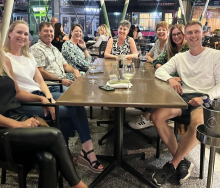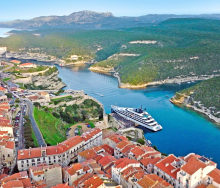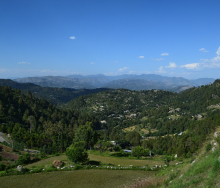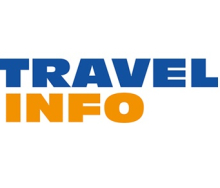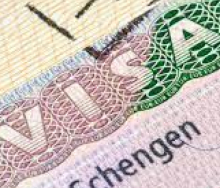Meeting of minds is key for 2020
AN IMPROVEMENT
in the relationship
between travel
agents and airlines will
be essential to face
the challenges that lie
ahead in 2020, industry
representatives agree.
“A meeting of minds
is going to be key and
it’s most certainly time
that Asata, Aasa and
Barsa played an ever
more important role in
bridging the gaps,” says
FlySafair head of sales and
distribution, Kirby Gordon.
“Both parties [agents
and airlines] are due to
be under a good deal
of pressure. The only
way we’re both going to
survive is to foster a better
understanding of the basic
elements that underpin our
respective abilities to make
money and sustain our
businesses,” says Kirby.
“Agents need to sharpen
their pencils to reaffirm
their value in the face of
rampant corporate costcutting, but the expectation
should not be that airlines
must loosen up rules that
protect their revenue in
order for them to prove
this.
“Similarly, airlines should
not be unilaterally imposing
revenue protection
limitations without proper
understanding of how
that might play out in the
agents’ world,” Kirby says.
Sure Travel ceo, Vanya
Lessing, says trust can
only be improved when
there is less hostile
competition. “Measuring
performance is critical, but
managing relationships is
just as important to create
a sustainable, competitive,
profitable future between
agents and airlines.”
Air Mauritius regional
manager Africa and Latin
America, Carla da Silva,
emphasises the need for
transparent conversations
and strong partnerships.
“The best solution to the
customer should be our
number-one objective.”
Asata ceo, Otto de Vries,
says given the changing
nature of the relationship
between travel agents
and airlines, heightened
awareness and a renewed
commitment are needed
to support what the travel
agent’s value is in the
supply chain.
“Travel agents have
to continue to innovate
and deliver a more
personalised service. The
focus has to be on finding
new ways to improve
the traveller experience
through customisation,
data analytics solutions
and appropriate booking
tools.”
XL Travel ceo, Marco
Ciocchetti, says all signs
suggest the corporate
sector should grow in
2020 as businesses
pursue new opportunities.
“I do foresee, however, that
corporate travel budgets
will be under pressure and
the consolidation of spend
will become increasingly
important for travel
managers.”
More than any other year,
2019 was about improving
the traveller experience,
Marco adds.
“TMC services are now
as concerned with meeting
the needs of travellers as
they are with managing
and optimising company
spend. Blended technology
– the mix of AI, machine
and human interaction to
improve service levels and
offering travellers 24-hour
live support – is a priority.”
Currency challenges
Rand weakness and
economic instability will
remain a challenge, but
it’s for the TMC to create
efficiencies and provide a
travel policy that fits each
company, he adds.
“The SA currency will
have a significant influence
on travel, especially in the
leisure sector, which could
influence travel to popular
but expensive destinations
like Europe and the USA.”
Agents agree that the
strongest headwind
coming in 2020 is Iata’s
NewGen ISS, which will put
pressure on the cashflow
of agents who are still
financing corporate and
government travel, and who
have clients paying them
monthly.
“Fortunately, Asata
has negotiated with Iata
to retain the monthly
remittance until April 30,
which will allow agents
to renegotiate payment
terms with their clients,”
Marco says.
Implementation of
NewGen ISS, Iata EasyPay
and Transparency in
Payments (TIP) will
continue in 2020,
confirms Perry Flint,
Iata spokesman. He
welcomes that credit card
companies are beginning
to develop products for
agents that fit within the
TIP requirements. He says
Iata’s new consolidated
Customer Service Centre
now serves airlines and
agents from four locations
(Beijing, Madrid, Montreal
and Singapore) on
weekdays, and 24/7 hours
for critical services.
A new Iata Customer
Portal provides userfriendly information on key
operational issues such as
BSP reports and calendars,
changes to remittance
frequencies, payment of
annual fees and roll-out
of projects in specific
markets.
“All these should
positively impact the travel
agency community,” he
says.
See comments from
Janet Aldworth (Sure
Voyager Travel and Tours)
on page 8 for tips on
how agents can prosper
during the interesting and
worrying year ahead.
Top trends
Personalised service will
be a top trend in 2020,
as will consolidation
of spend for corporate
travel, says Andrew
Grunewald (right),
Flight Centre Business
Travel brand leader.
Clients who have been using two or three
corporate travel agents are now opting
to consolidate this spend with just one
agent, he adds. Andrew also expects a
huge growth in the SMME market. There
has been an increase in demand for
simpler fee structures for SMMEs and he
sees this trend continuing.
To the point
Parity between public and corporate rates remains a big challenge
in the market and The Capital Hotels and Apartments has formed an
entire team to build a rate structure to give bookers in all segments
the best rate available, says coo, Garnet Basson. “We’ve also
employed an IT and online expert to assess, improve and change
systems and processes to give our guests a more efficient, high-tech
and high-touch experience. This will include customer experiences
such as being able to book, confirm and check in seamlessly online,
to ordering a drink at the pool using our app.
Photocap: Regent guests go local
With the launch of the new season, Regent Seven Seas Cruises (RSSC) is sailing to
lesser-known destinations, highlighted by included immersive land experiences in
every port. Janine Pretorius, owner of Encore Cruises, says RSSC has revealed 65 new
Med and Northern Europe shore excursions debuting exclusively for guests during
the inaugural 2020 season of Seven Seas Splendor. Excursions include soaring in a
helicopter outside Monaco on the way to a meal at La Bastide de Moustiers. RSSC
is also bringing Alaska to life on Seven Seas Mariner with experiences including
raptors, folk singers and Tlingit historians. Shore excursions incorporate new Go Local
Tours and other engagements where guests can explore Juneau (pictured), Ketchikan,
Skagway and Sitka.
Environment and climate change top the agenda
CONCERNS about the
environment and climate
change will be at the top of
the industry agenda for 2020,
not just for airlines, but for all
participants in the travel value
chain.
This is the belief of Iata’s,
Perry Flint. “In addition to
flying, tourism itself has come
under sustained criticism over
its environmental impact.”
Another issue is the
imposition of new taxes on
airlines and air travellers.
“In many cases, these
new taxes are labelled as
‘environmental’, although
funds are rarely, if ever,
earmarked to helping aviation
become greener.”
High taxes and fees are a
particular problem in Africa
where jet fuel costs 35%
more than the global average
and user charges account
for 11,4% of African airlines’
operating costs – double the
industry average.
Aasa and Barsa continue to
monitor and lobby against the
imposition of new taxes and
charges in the region.
The biggest challenge for
Barsa airlines is to obtain
Foreign Operator Permits from
the Department of Transport
and the SA Civil Aviation
Authority.
“The issuance and approvals
can take up to six months
where the norm is around 21
days,” says Barsa ceo, June
Crawford. “The paperwork
required for each application
is excessive and the
permits are only valid for 12
months. Each aircraft with its
specific registration must be
approved by the authorities.”
Meanwhile, adequate
infrastructure capacity
remains a challenge in 2020,
says Perry.
“If aviation is to grow its
benefits, we must have
adequate, affordable airport
and air traffic infrastructure
to support future demand.
That’s certainly not the case
today.”
He says critically congested
airports in the world lead
to delays and inefficiencies,
resulting in excess fuel burn
and CO2 emissions.
June says Barsa will keep
an eye on ensuring that
Acsa’s capital expenditure
projects proceed without
any further delays this year,
such as the re-alignment of
the runway at Cape Town
International Airport.
She says Barsa airlines
operating in Africa are
maligned for taking traffic
away from African carriers,
but this is due to the slow
reaction to the Single
African Air Transport Market
(SAATM).
Aasa ceo, Chris
Zweigenthal, says 31
countries signed up to
SAATM by November
2019, but obstacles to its
implementation remain.
Meanwhile, co-operation
between the airline industry
and tourism through the
Tourism Business Council of
SA (TBCSA) has succeeded
in getting tourism on the
agenda of the Public Private
Growth Initiative of President
Cyril Ramaphosa.
“The President’s numbertwo priority is tourism, which
includes the travel trade and
airlines, and we hope to build
on this collaboration,” says
June.
Industry co-operation
through the TBCSA has
also been credited with
the milestone success of
having the unabridged birth
certificate requirement
removed for foreign minors.
Industry is now working
toward achieving the same
for South African children,
with further consultations
with Home Affairs – also
for more visa waivers and
e-visas – to follow.
“Last year showed that
success can be achieved
through collaboration and
co-operation, and I’m
optimistic this positive spirit
will continue into 2020,”
says Chris.
More meaningful travel in 2020
NEW products and
destinations as well as an
increasing emphasis on the
environment and meaningful
experiences will be on offer
from local tour operators in
the year ahead.
Beachcomber Tours
anticipates an extensive
renovation to the popular
Shandrani Beachcomber.
In addition, says sales and
marketing director Joanne
Visagie, the trade can
expect upgrades big and
small throughout the eight
Beachcomber resorts in
Mauritius.
Latching on to the growing
move toward vegetarian/
vegan diets, Shandrani
Beachcomber now features
an eatery dedicated to
this trend while Dinarobin
Beachcomber sports a
restaurant serving only
high-quality local produce.
The group will also continue
to emphasise its Beautiful
Experiences and has
adopted ‘We Walk Our Talk’
– 52 tangible commitments
to the planet.
Travel Vision, too, will
increase its portfolio of
experiential travel products
under the Explorers Range
in 2020.
Ceo Dharmesh Koovarjee
says the increase in
demand for experiential
travel among the local travel
trade is noticeable and
Travel Vision will answer
it with more workshops
featuring this trend in 2020.
Travel agents can also look
forward to faster responses
from the company. “We’ve
embarked on a strategy to
improve our turnaround time
and have already seen an
improvement.”
The Travel Corporation
(TTC) has identified ‘under
tourism’ as one opportunity
this year, among many.
According to md Teresa
Richardson, the group
is placing increasing
importance on better
dispersal to ease the
pressures of over tourism.
Thus, relatively unknown
destinations such as
Colombia and the Balkan
countries will be two new
products introduced in
2020. Trafalgar is now
offering a 13-day ‘Colombia
Rediscovered’ trip beginning
in Bogotá, as well as the
10-day ‘Art, Culture and
Cuisine of Colombia’.
Contiki features a nine-day
‘Colombian Coasts and
Culture’ programme.
Along with its various
forms of travel agent
support, TTC has great
incentives in place to
motivate agent partners
to hit targets. Trafalgar’s
Acclaim will be taking top
agents to Northern Ireland
later this year while the
CostSaver Crew incentive
will see winning agents visit
the top eco-destination in
the world – Costa Rica.
Asked what she would like
to see from tour operators
in 2020, Club Travelbranded ITC, Sarah Thom,
said: “Incentives always go
down well.”
News flash!
The City Lodge Hotel Group has announced that properties under
development include the 168-room Courtyard Hotel Waterfall
City and the 148-room City Lodge Hotel Maputo. “Once they
are operational, the group will have 63 hotels in six countries
in Southern and East Africa, offering 8 070 rooms,” says ceo
Andrew Widegger. The group is looking for ways to reduce
its carbon footprint and increase conservation efforts. “A recent
example is the roll-out of solar panels at 25 hotels.” It is also
looking forward to continuing its positive relationship with the
travel industry, cementing relationships and forming new ones.
“We have a strong sales team around the country and into East
Africa where we have four hotels,” says Andrew.
How to survive the year ahead
THE travel agent who is set
to prosper this year is one
who has specialised.
This is the belief of Janet
Aldworth, md of Sure
Voyager Travel and Tours. “If
you want to be treated as a
travel consultant and not a
travel clerk, put emphasis
on making your knowledge
and expertise something
people will pay for.”
It will be a challenging year
for agencies of all sizes,
but mostly the corporate
agencies because of the
sun setting on monthly
remittance in April, she
says.
“Those willing to continue
extending credit to their
clients will face a difficult
time managing cash flow.
Smart agents are the ones
changing their business
models now and discussing
with clients a move to credit
card or paying in 15 days.”
The agents who do have
cash flow will pick up clients
easily by offering longer
credit terms, she adds. “It
is sad that we will have
predatory behaviour in the
market-place, but with times
being tough, this behaviour
will surface.”
Agents need to do their
homework on the other
new processes coming
into the business realm so
their companies are ready
well ahead of deadlines,
she adds. “Asata is doing
a great job educating its
members and helping them
get ready.”
Throw SAA into the mix
and we have an interesting
and worrying year, continues
Janet. “We should support
the national carrier to try
to lessen the blow if it
closes, but agents need
guarantees that by selling
the airline they won’t be
left having to save their
passengers if SAA fails.
Insurance must be sold
to everyone. The loss of
override commissions from
SAA will put huge pressure
on the agent community
and that income has to be
found elsewhere – further
exacerbating the problems
at SAA.”
Janet says those agents
who are following Asata’s
advice are thriving. “Others
who didn’t are struggling
and unlikely to make it
through this difficult year.
Did you know ?
Azamara is visiting South African shores for the first time in 2020 as part of the line’s world cruise voyages, and Crystal Esprit (Crystal Cruises) will be in the Seychelles for 2020 and 2021, confirms Cruises International head of product, Thaybz Khan. “From the portfolio of brands that we represent, we have new ships from almost all the brands, which means new destinations and unique itineraries.”
Mango sets sights high
MANGO Airlines
is looking at
2020 to be a
watershed year
and a time
when the carrier
hopes to evolve
rapidly in terms
of both route
network and
product.
Ceo, Nico
Bezuidenhout,
says Mango
plans to make a number
of announcements on
codeshare and interline
agreements, whilst also
enhancing its on-board
product offering.
“Mango is also fully intent
on establishing a stronger
and mutually beneficial
relationship with the travel
trade in SA. We believe
the trade represents an
important element of the
travel distribution value
chain. Similarly, Mango,
with about 20% domestic
market share,
serves as
an important
provider of airlift
in our country.”
He says
2019 posed
substantial
challenges,
with constraints
on economic
growth placing
pressure on
consumer
demand.
“Intensity in
local competition continued
unabated.”
Mango itself had a
challenging year, he
continues, with poor
on-time performance
(showing a marked
improvement in recent
weeks) affecting overall
service reliability.
“Mango intends to return
to the basics of offering
affordability, reliability and
accessibility of air travel to
South Africans, by South
Africans,” he says.


